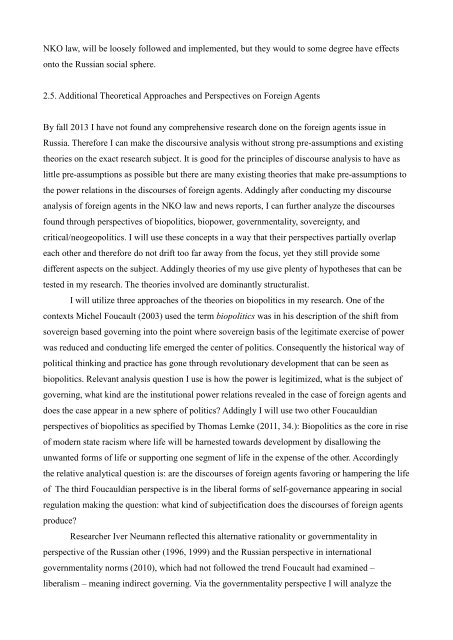Foreign Agents in Russia - Doria
Foreign Agents in Russia - Doria
Foreign Agents in Russia - Doria
You also want an ePaper? Increase the reach of your titles
YUMPU automatically turns print PDFs into web optimized ePapers that Google loves.
NKO law, will be loosely followed and implemented, but they would to some degree have effects<br />
onto the <strong>Russia</strong>n social sphere.<br />
30<br />
2.5. Additional Theoretical Approaches and Perspectives on <strong>Foreign</strong> <strong>Agents</strong><br />
By fall 2013 I have not found any comprehensive research done on the foreign agents issue <strong>in</strong><br />
<strong>Russia</strong>. Therefore I can make the discoursive analysis without strong pre-assumptions and exist<strong>in</strong>g<br />
theories on the exact research subject. It is good for the pr<strong>in</strong>ciples of discourse analysis to have as<br />
little pre-assumptions as possible but there are many exist<strong>in</strong>g theories that make pre-assumptions to<br />
the power relations <strong>in</strong> the discourses of foreign agents. Add<strong>in</strong>gly after conduct<strong>in</strong>g my discourse<br />
analysis of foreign agents <strong>in</strong> the NKO law and news reports, I can further analyze the discourses<br />
found through perspectives of biopolitics, biopower, governmentality, sovereignty, and<br />
critical/neogeopolitics. I will use these concepts <strong>in</strong> a way that their perspectives partially overlap<br />
each other and therefore do not drift too far away from the focus, yet they still provide some<br />
different aspects on the subject. Add<strong>in</strong>gly theories of my use give plenty of hypotheses that can be<br />
tested <strong>in</strong> my research. The theories <strong>in</strong>volved are dom<strong>in</strong>antly structuralist.<br />
I will utilize three approaches of the theories on biopolitics <strong>in</strong> my research. One of the<br />
contexts Michel Foucault (2003) used the term biopolitics was <strong>in</strong> his description of the shift from<br />
sovereign based govern<strong>in</strong>g <strong>in</strong>to the po<strong>in</strong>t where sovereign basis of the legitimate exercise of power<br />
was reduced and conduct<strong>in</strong>g life emerged the center of politics. Consequently the historical way of<br />
political th<strong>in</strong>k<strong>in</strong>g and practice has gone through revolutionary development that can be seen as<br />
biopolitics. Relevant analysis question I use is how the power is legitimized, what is the subject of<br />
govern<strong>in</strong>g, what k<strong>in</strong>d are the <strong>in</strong>stitutional power relations revealed <strong>in</strong> the case of foreign agents and<br />
does the case appear <strong>in</strong> a new sphere of politics? Add<strong>in</strong>gly I will use two other Foucauldian<br />
perspectives of biopolitics as specified by Thomas Lemke (2011, 34.): Biopolitics as the core <strong>in</strong> rise<br />
of modern state racism where life will be harnested towards development by disallow<strong>in</strong>g the<br />
unwanted forms of life or support<strong>in</strong>g one segment of life <strong>in</strong> the expense of the other. Accord<strong>in</strong>gly<br />
the relative analytical question is: are the discourses of foreign agents favor<strong>in</strong>g or hamper<strong>in</strong>g the life<br />
of The third Foucauldian perspective is <strong>in</strong> the liberal forms of self-governance appear<strong>in</strong>g <strong>in</strong> social<br />
regulation mak<strong>in</strong>g the question: what k<strong>in</strong>d of subjectification does the discourses of foreign agents<br />
produce?<br />
Researcher Iver Neumann reflected this alternative rationality or governmentality <strong>in</strong><br />
perspective of the <strong>Russia</strong>n other (1996, 1999) and the <strong>Russia</strong>n perspective <strong>in</strong> <strong>in</strong>ternational<br />
governmentality norms (2010), which had not followed the trend Foucault had exam<strong>in</strong>ed –<br />
liberalism – mean<strong>in</strong>g <strong>in</strong>direct govern<strong>in</strong>g. Via the governmentality perspective I will analyze the
















